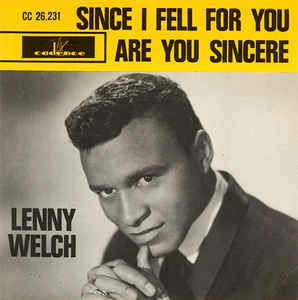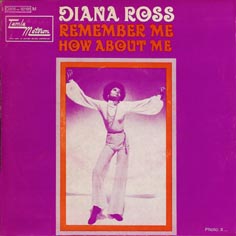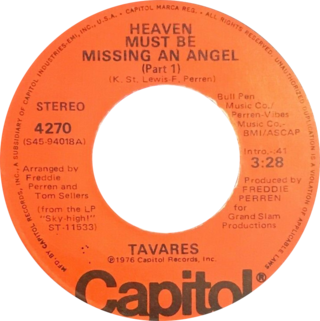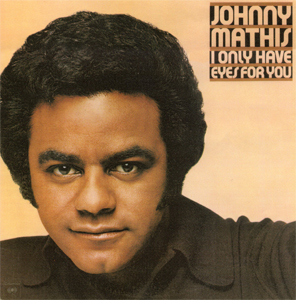Related Research Articles
"You Always Hurt the One You Love" is a pop standard with lyrics by Allan Roberts and music by Doris Fisher. First recorded by the Mills Brothers, whose recording reached the top of the Billboard charts in 1944, it was also a hit for Sammy Kaye in 1945.

"Until You Come Back to Me (That's What I'm Gonna Do)" is a song written by Morris Broadnax, Clarence Paul, and Stevie Wonder. The song was originally recorded by Stevie Wonder in 1967, but his version was not released as a single and did not appear on an album until 1977's anthology Looking Back. The best-known version of this song is the 1973 release by Aretha Franklin, who had a million-selling top 10 hit on Billboard charts. The song reached No. 1 on the R&B chart and No. 3 on the Hot 100 chart in 1974. It became an RIAA Gold record.

"Heaven Help Us All" is a 1970 soul single composed by Ron Miller and first performed by Motown singer Stevie Wonder. The song continued Wonder's string of Top 10 singles on the pop charts reaching #9 on the Hot 100 singles chart and #2 on the R&B chart, the latter causing it to be his first runner-up since "Yester-Me, Yester-You, Yesterday". It was one of four hits Wonder scored from his Signed, Sealed & Delivered album. The song has since been covered dozens of times in a variety of styles.
"Walk on the Wild Side" originated as the title song of the 1962 film of the same name as performed by Brook Benton over the film's coda and closing credits. Lyrics were written by Mack David and music was by Elmer Bernstein. The two earned an Oscar nomination for Best Original Song.

"Since I Fell for You" is a blues ballad composed by Buddy Johnson in 1945 that was first popularized by his sister, Ella Johnson, with Buddy Johnson and His Orchestra.

"Whatcha Gonna Do?" is a song by American rock group Pablo Cruise. This song was written by David Jenkins and Cory Lerios, two of the band's members. "Whatcha Gonna Do?" was a track from their album A Place in the Sun in 1977.

"Remember Me" is a 1970 single recorded and released by singer Diana Ross on the Motown label and was included on her 1971 album Surrender. The song was released as the album's first single on December 8, 1970 by the label. It was written and produced by Ashford & Simpson. In the US, the song was Ross' third top forty pop hit within a year, peaking at number 16 on the Hot 100 chart and number 10 on the soul chart. It was also Diana Ross' third entry on the Easy Listening chart, where it went to number 20. It gave Diana her third gold single in a year and her third top 10 charting single in Cash Box, peaking at number eight. Overseas, "Remember Me" reached the top ten in the UK, where it reached number seven. It was the lead single from Ross' 1971 album, Surrender.
"Lover, Come Back to Me" is a popular song composed by Sigmund Romberg with lyrics by Oscar Hammerstein II for the Broadway show The New Moon, where the song was introduced by Evelyn Herbert and Robert Halliday. The song was published in 1928.

"Wake Up Everybody" is an R&B song written by John Whitehead, Gene McFadden and Victor Carstarphen.

"Love Ballad" is a song by R&B/Funk band L.T.D. Jeffrey Osborne is the lead singer.
"Trust in Me" is a song written by Ned Wever, Milton Ager, and Jean Schwartz. Popular versions in 1937 were by Mildred Bailey and by Wayne King & his Orchestra.

"Love on a Two-Way Street" is a soul ballad written by Sylvia Robinson and Bert Keyes in 1968. The song was originally recorded by Lezli Valentine, an artist signed to All Platinum, the record label that Sylvia Robinson co-owned with her husband, Joe. The song was then recorded by The Moments, an R&B vocal group signed to All Platinum subsidiary Stang Records, as filler for their 1968 album Not on the Outside, But on the Inside, Strong!. Sylvia and Joe decided to release the song as a single in March 1970 and it went on to become one of the biggest R&B hits of that year, spending five weeks at number one on Billboard's Soul Singles chart and reaching number three on the Hot 100 chart. Billboard ranked the record as the No. 25 song of 1970. It was also certified gold by the RIAA for sales of one million copies.

"Love or Let Me Be Lonely" is a pop song recorded by the soul group The Friends of Distinction and released as a single in early 1970. The song was a multi-format success, peaking in the top 10 of the Billboard Hot 100 at #6 on May 1, 1970 and at #13 on the R&B chart. On the Adult Contemporary singles charts, "Love or Let Me Be Lonely" went to #9. The song is ranked as the 63rd biggest hit of 1970.
"Share Your Love with Me" is a song written by Alfred Braggs and Deadric Malone. It was originally recorded by blues singer Bobby "Blue" Bland. Over the years, the song has been covered by various artists, most notably Aretha Franklin who won a Grammy Award for her 1969 rendition. Other artists who covered the song include The Band in 1973, Kenny Rogers in 1981, and most recently, Van Morrison in 2016.

"Heaven Must Be Missing an Angel" is a disco song written by Freddie Perren and Keni St. Lewis. It was recorded by the American band Tavares in 1976. It was released as the first single from their fourth album, Sky High! (1976), and was split into two parts: the first part was 3 minutes and 28 seconds in length, while the second part was 3 minutes and 10 seconds. "Heaven Must Be Missing an Angel" was re-released in February 1986.
"Stop to Love" is a song by American recording R&B/soul artist Luther Vandross. Released in 1986 as the lead single from his album Give Me the Reason. It was his first number-one single on the R&B chart since "Never Too Much" in 1981. The upbeat single was also a crossover hit, peaking at number fifteen on the Billboard Hot 100.
"A Lover's Question" is a 1958 Pop, R&B hit for Clyde McPhatter. The single was written by Brook Benton and Jimmy T. Williams and was Clyde McPhatter's most successful Pop and R&B release. The bass singer is Noah Hopkins. "A Lover's Question" made it to #6 on the Billboard Hot 100 and was #1 for one week on the R&B chart.
"Funny How Time Slips Away" is a song written by Willie Nelson and first recorded by country singer Billy Walker. Walker's version was issued as a single by Columbia Records in June 1961 and peaked at number 23 on the Hot C&W Sides chart. The song has been featured in several live action films and television shows, such as in the first episode of the second season of AMC’s Better Call Saul and in the 2020 Netflix drama The Devil All the Time.
"Next Door to an Angel" is a rock and pop song written by Neil Sedaka and Howard Greenfield and recorded by Neil Sedaka in 1962. It was issued by RCA Victor Records. It reached No. 5 on the Billboard Hot 100 in late 1962. "Next Door to an Angel" also went to No. 19 on the Hot R&B Singles chart. It was Sedaka's last appearance on the American Top 10 until "Laughter in the Rain" in late 1974.

I Only Have Eyes for You is an album by American pop singer Johnny Mathis that was released on May 10, 1976, by Columbia Records and included two new songs, "Yellow Roses on Her Gown" and "Ooh What We Do", which was written specifically for him, as well as a contemporary arrangement of the 1934 title track that foreshadowed his recordings of standards that incorporated a disco beat a few years later.
References
- ↑ "Teach Me Tonight - Jazz Standards", JazzStandards.com
- ↑ Whitburn, Joel (1986). Joel Whitburn's Pop Memories 1890-1954 . Wisconsin, USA: Record Research Inc. p. 590. ISBN 0-89820-083-0.
- ↑ Whitburn, Joel (2004). Top R&B/Hip-Hop Singles: 1942-2004. Record Research. p. 612.
- ↑ "The De Castro Sisters - It's Love / Teach Me Tonight". Discogs. Retrieved May 6, 2022.
- ↑ Whitburn, Joel (2013). Joel Whitburn's Top Pop Singles, 14th Edition: 1955-2012. Record Research. p. 226.
- ↑ Whitburn, Joel (2013). Top Pop Singles 1955-2012 (14th ed.). Menomonee Falls, Wisconsin: Record Research Inc. p. 528. ISBN 978-0-89820-205-2.
- ↑ Whitburn, Joel (2004). Top R&B/Hip-Hop Singles: 1942-2004. Record Research. p. 292.
- ↑ Whitburn, Joel (2002). Top Adult Contemporary: 1961-2001. Record Research. p. 125.